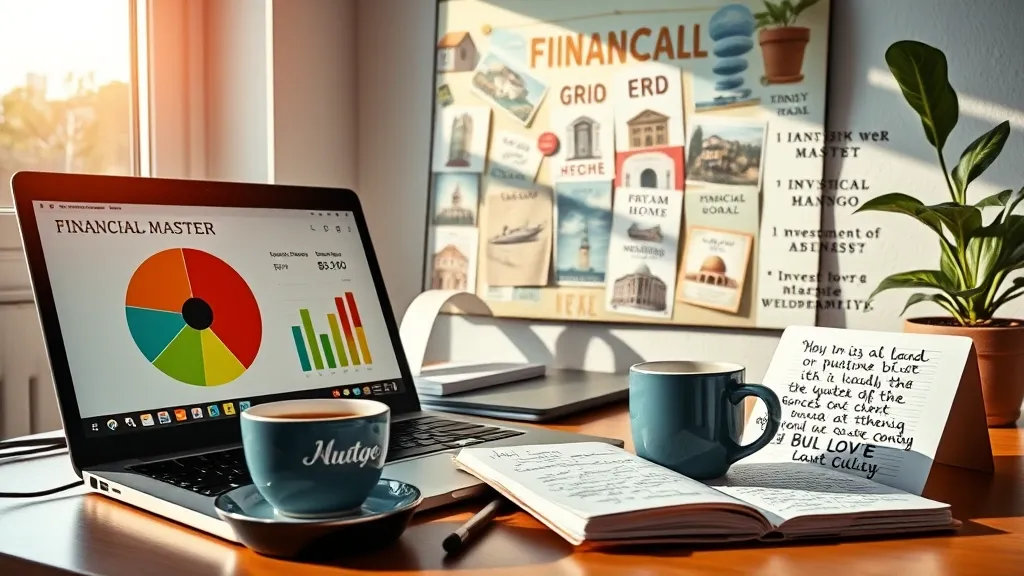The Art of the Budget: Crafting Your Financial Masterpiece
Alright, let’s talk about budgeting. Yeah, I know—sounds about as exciting as watching paint dry, right? But hear me out! Think of your budget as a canvas where you get to paint your financial future. It might feel a bit messy at first, but with some practice, you can create a masterpiece.
First off, you gotta know what you’re working with. It’s like going into a restaurant without checking the menu first. You wouldn’t want to end up with something you can’t afford, right? So, grab all those bills, bank statements, and maybe that mysterious envelope you’ve been avoiding. You’ll need to figure out your income (the money coming in) and your expenses (the money going out). Spoiler alert: the goal is to have more coming in than going out!
- Track Your Income: List all sources of income—your job, side hustles, that random cash you found in your jeans. You’d be surprised how much adds up!
- List Your Expenses: This part can be a bit of a downer. Write down everything—rent, food, Netflix. Yes, even that avocado toast you love. It all counts.
Next up, it’s time to divide those expenses into needs and wants. Needs are the essentials—like rent, utilities, and food. Wants? Well, that’s your weekly takeout, fancy coffees, and all those little splurges that make life sweet. We all deserve a little sweetness, right?
Now, here’s where the magic happens: set some limits. It’s like giving your bank account a little TLC. For example, maybe you decide to spend only $50 a week on dining out. Sure, it might mean cooking at home a bit more (hello, spaghetti again!), but your future self will thank you when you see those savings grow.
And don’t forget to revisit your budget regularly. Life changes, and so should your budget. If you get a raise or decide to ditch that daily latte (gasp!), adjust those numbers. It’s not a set-it-and-forget-it deal. Think of it as a living, breathing thing—like a pet, but less messy and without the need for walks.
In the end, budgeting isn’t about restricting yourself; it’s about giving yourself freedom. A solid budget lets you enjoy those little things while also planning for the big stuff, like that dream vacation or a new car. So grab your paintbrush (or spreadsheet), and start crafting your financial masterpiece!
The Treasure Hunt: Finding Hidden Gems in Your Expenses
Alright, folks, let’s talk about something we all love to avoid—budgeting. I know, I know, it sounds about as fun as watching paint dry. But stick with me; I promise it can be a little like a treasure hunt. Seriously, if you look closely, there are hidden gems in your expenses just waiting to be discovered!
First off, grab your bank statements, and let’s get a little nosy. This is where the magic happens. You might be surprised at what you find lurking in there. Did you really need that subscription to a service you’ve never used? Or how about that daily coffee run that adds up to a small fortune? I mean, I love my caffeine fix as much as the next person, but do I really need to *buy* it every day? Maybe it’s time to start brewing at home. Just sayin’!
- Identify the Regulars: Start by listing out your regular expenses—rent, utilities, and those sneaky subscriptions. It’s like finding the usual suspects in a crime drama. Once you spot them, it’s easier to see where you can cut back.
- Spot the Unnecessary: Next, look for things you don’t truly need. Like that gym membership you swore you’d use but now serves as a fancy place to hang your clothes. I mean, who hasn’t been there, right?
- Compare and Contrast: If you have a few services you use, don’t hesitate to shop around. Maybe there’s a better deal out there that’ll save you a few bucks. Think of it as swiping left on the bad dates of your bank account.
Another thing I’ve found helpful is tracking my spending. Sounds boring? It’s actually kinda eye-opening! There are apps for that, and they make it super easy. You can see where your money goes, and trust me, it can be a real wake-up call. You might find that you’re spending way more on takeout than you thought. Whoops! Maybe it’s time for some meal prep Sundays.
Now, let’s not forget about those unexpected expenses. You know, the ones that hit you out of nowhere like a surprise party you didn’t want? Having a little buffer in your budget can help ease the blow. It’s like a financial safety net, and nobody wants to fall flat on their face.
In the end, finding those hidden gems in your expenses is all about being a little curious and maybe a tad ruthless. It’s your money, after all. So, dig in and start your treasure hunt—you might just uncover some cash you didn’t even know you had!
The Investment Playground: Where Your Money Plays and Grows
Alright, let’s dive into the investment playground! Think of it like a giant sandbox where your money can run wild, build castles, or, let’s be real, sometimes get buried under a pile of sand. But don’t worry; with the right tools and a little know-how, you can make sure it’s more of a fun day at the park than a total disaster.
First off, investing isn’t just for Wall Street suits or those folks who seem to know what a “bull market” is. It’s for anyone who wants to make their hard-earned cash work a little harder. And trust me, it’s way more exciting than leaving it sitting in a savings account, collecting dust and maybe a few pennies in interest.
So, where do you even start? Here’s a thought: think about what you’re interested in. I mean, if you love tech gadgets, why not consider investing in tech companies? Or if you’re all about sustainable living, green energy stocks could be your jam. It’s like choosing a hobby but with the added bonus of possibly making some cash on the side. Who doesn’t want that?
- Stocks: These are like the cool kids in school. They can be risky, but if you pick the right ones, they can grow your money fast.
- Bonds: Think of these as the reliable friends who always show up on time. They don’t usually grow as fast as stocks, but they’re much safer.
- Mutual Funds: A buffet of investments! You get a mix of stocks and bonds, which can be great if you’re not sure where to put your money.
- Real Estate: This is like the long-term relationship of investments. It takes time to build, but can pay off big in the long run.
Now, I know what you’re thinking: “But what if I lose my money?” Well, here’s the deal: every investment comes with risk, but with great risk can come great reward (thanks, Spiderman!). The key is to do your homework, stay informed, and maybe even chat with a financial advisor. They can help you figure out what’s right for you.
Remember, the goal isn’t to get rich overnight. It’s about playing the long game, letting your money grow over time, and hopefully enjoying the ride. So grab your metaphorical shovel and get digging in that investment sandbox. Who knows what treasures you’ll uncover?
The Financial Fortune Teller: Predicting Your Future with Smart Planning
Okay, let’s be real for a second. If there was a crystal ball that could show us exactly how to manage our finances without any bumps in the road, I think we’d all be lined up at the fortune teller’s door, right? But alas, life isn’t that easy, and our wallets don’t come with an instruction manual. So, what can we do instead? Well, it all boils down to some good ol’ smart planning.
First off, let’s talk budgeting. I know, I know, the word itself can make you want to curl up in a ball and hide under your bed. But hear me out! A budget isn’t a chain around your ankle; it’s more like a map. It helps you navigate the wild terrain of your finances. You wouldn’t go on a road trip without a GPS, would you? So why would you handle your money without a plan? (Spoiler alert: you shouldn’t!)
Start by tracking your income and expenses. Seriously, just jot it down. There are apps for that now, but honestly, even a good old-fashioned notebook works. Once you see where your money’s going, you can make some tweaks here and there. Maybe that daily coffee run isn’t as necessary as you thought? Or perhaps that streaming service you haven’t used in months could be axed? It’s all about prioritizing what really matters to you.
Now, let’s sprinkle in some savings. Think of it as your financial safety net. You never know when life’s gonna throw a curveball—like your car breaking down or an unexpected medical bill. I mean, I once had to shell out for a new tire because I thought “Oh, I can wait a few more weeks.” Spoiler alert: I couldn’t. So, aim to save at least 20% of your income. If that sounds too steep, start smaller and build up. The important thing is to start.
Investing is another piece of this puzzle. Don’t worry if you feel lost here; most people do! It’s like trying to navigate a new city without a map. But the sooner you get started, the better. Even small investments can grow over time. Think of it like planting a tree. You won’t get shade overnight, but eventually, you’ll have a nice place to chill.
In the end, predicting your financial future isn’t about magic; it’s about being smart and intentional with your money. With some planning, a sprinkle of discipline, and maybe a little bit of luck, you can set yourself up for success. And who knows? Maybe one day, you’ll be the one giving advice like a financial fortune teller!



